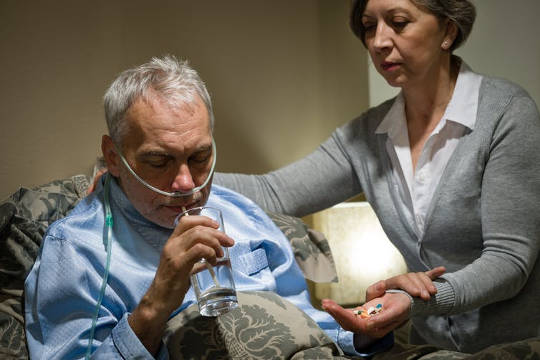
Caring for a friend or family member can be highly challenging. Shutterstock
Dying is changing. It used to be quick and unexpected for most, due to infection or trauma. Now it comes to us, in general, when we are older – caused by chronic medical conditions such as heart, kidney or lung disease, diabetes or dementia.
The good news is that we are living longer. The bad news is that many more of us will live long enough to die from complicated health conditions – which often need care over many months or even years.
It’s predicted an extra 100,000 people will die each year by 2040. So the stark reality is that most of us will either provide care or need it, in the approach to death. And most of us will look to our nearest and dearest – our family – to give us that support.
Caring for the dying
While helping someone during a terminal illness can be rewarding, there are costs – work pressures or losing employment altogether, financial losses, worsening health and social isolation. Family carers do not by and large volunteer, nor are they trained. They just find themselves with someone who needs care and they step up to the mark. Few get the support needed – at the time, or afterwards.
Researchers at the Wolfson Palliative Care Research Centre included questions in the Household Survey for England about caring at the end of life. The findings show that one in four people had had someone close to them die in the previous five years. Of these, one in three had provided personal care. Australian figures are similar.
A dying shame
It’s clear though from this study, that caring for someone close to you can take its toll – one in ten carers said they would not provide such care again under the same circumstances.
These people were more likely to be older, and where the person had died did not have access to palliative care services. Patients without such support are also more likely to die in hospital and less likely to die at home.
As it is highly likely many of us will be called upon to support a family member or friend at the end of their lives – and may need to give this help more than once – and society together can’t afford for this experience to be so bad that family carers wouldn’t want to do it again.
Ending life well
Research has shown that carers are more likely to be willing to provide care again if they are supported by palliative care services. Research has shown that the support provided by such care can mean the difference between coping and not coping for family and friends.
Despite what many think, palliative care services are not just for people with immediate painful death sentences due to cancer. They are there for anyone with a progressive illness, providing an important layer of care alongside usual treatment to help patients live as well as they can. These services may be needed off and on for months or even years – not just during the last few days of life.
The UK has one of the world’s most developed palliative care services, yet many people still miss out. Older people, people in socioeconomically disadvantaged areas, and those with diseases other than cancer are all less likely to access palliative care services.
This view – that palliative care services are for other people – coupled with society’s reluctance to talk about death is a toxic mix. Ultimately, it means that many patients and their families – who could benefit from this extra support for persistent symptoms and other concerns – may not know about palliative care. Or they may be too scared to accept a referral to the service in the first place.
So given the fact that the coming years will see a sharp rise in the number of people dying and needing care from their family and friends, it’s clear we need to start talking about living with serious illness, death, and palliative care, sooner rather than later. Good palliative care is something we should insist on having access to, not something we avoid at all costs – as that cost is far too great.
About The Authors
Miriam Johnson, Professor of Palliative Medicine, University of Hull and David Currow, Professor of Palliative Medicine, University of Technology Sydney
This article was originally published on The Conversation. Read the original article.
Books by these Authors
at

Thanks for visiting InnerSelf.com, where there are 20,000+ life-altering articles promoting "New Attitudes and New Possibilities." All articles are translated into 30+ languages. Subscribe to InnerSelf Magazine, published weekly, and Marie T Russell's Daily Inspiration. InnerSelf Magazine has been published since 1985.

Thanks for visiting InnerSelf.com, where there are 20,000+ life-altering articles promoting "New Attitudes and New Possibilities." All articles are translated into 30+ languages. Subscribe to InnerSelf Magazine, published weekly, and Marie T Russell's Daily Inspiration. InnerSelf Magazine has been published since 1985.
























